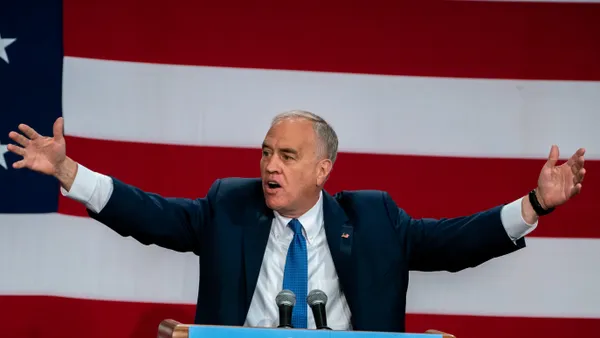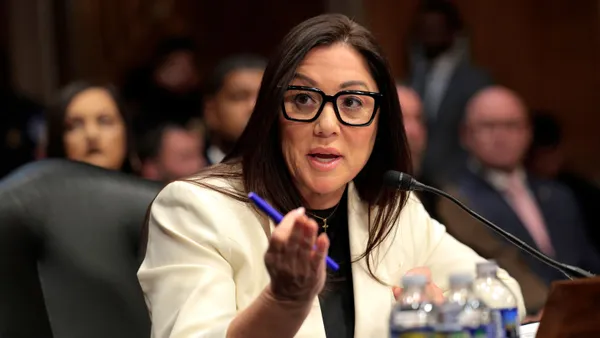Dive Brief:
- ExxonMobil filed a lawsuit against ESG-focused investors Arjuna Capital and Follow This, alleging the pair were in violation of federal securities laws in a suit filed Sunday in the Northern Texas District Court, according to court documents.
- Exxon is asking a federal court step in by March 19 to allow the natural gas company to exclude a shareholder proposal the two groups filed requesting the company to ramp up its scope 1 and scope 2 greenhouse gas emissions reductions efforts and set scope 3 targets like its peers in the oil and gas industry.
- The oil giant’s suit alleges “neither organization wants to improve [Exxon’s] business performance or increase shareholder value,” and accuses Arjuna and Follow This of wanting to disrupt the company’s investments and fossil fuel development and cause Exxon to change its business model.
Dive Insight:
Exxon said Arjuna Capital and Follow This, which both hold enough shares to receive voting power at the company, are “driven by an extreme agenda,” unlike most other shareholders who invest to help the growth of the company and to see a return on their investment, according to the suit. Exxon said Arjuna and Follow This became shareholders “solely to campaign for change” through shareholder proposals that are meant to “diminish the company’s existing business.”
The Texas-based oil company said the two groups have submitted similar shareholder proposals to energy companies before, including Exxon in 2022 and 2023, and Exxon shareholders have “consistently” rejected the proposals, which the suit describes as “expensive and time-consuming to address.”
Exxon said the groups’ 2023 proposal was voted down by 89.5% of shareholders. This is the first time the company has sought court action to exclude a shareholder proposal, according to Reuters.
“This sweeping intrusion into ExxonMobil’s ordinary business operations is designed to substitute Defendants’ preferences for the judgment of ExxonMobil’s management and board in determining how best to operate the company in an efficient and environmentally-conscious way,” the suit alleges.
Massachusetts-based Arjuna Capital and Amsterdam-based Follow This note in the proposal that Exxon’s current scope 1 and scope 2 targets are below recommendations by the Intergovernmental Panel on Climate Change, and the company has yet to set a scope 3 emissions target like its large oil and gas peers.
Energy companies BP, Repsol, Eni and Total Energy have set goals to reduce scope 1, scope 2 and scope 3 emissions by 30% by 2030, according to the proposal. Others including Chevron, Equinor, Shell and Suncor have set goals to reduce scope 3 emissions.
“Investors face economy-wide risks from climate change. We have a fundamental right and duty to voice concern over climate risk, its impacts on the global economy and shareholder value,” an Arjuna Capital spokesperson said in an emailed statement to ESG Dive.
The case was originally set to be handled by District Judge Reed O’Connor — who had ruled the Affordable Care Act to be unconstitutional in 2018, a ruling later overturned by the Supreme Court — but he submitted a recusal on Monday. Judge Mark Pittman will preside over the case instead, according to court filings.
In its filing, Exxon said the March deadline for relief in the case will give the company time to file its proxy statement by April 11 before its annual shareholder meeting on May 29.
Mark van Baal, founder of Follow This, said in a release that his group does not know why Exxon took this “remarkable step.” Exxon has previously allowed the proposals to reach the docket before advising shareholders to vote the proposal down, he said.
“ExxonMobil clearly wants to prevent shareholders using their voting rights,” van Baal said. “Apparently, the board fears investors will vote in favour of emissions reduction targets. It seems that ExxonMobil is afraid of its shareholders.”
Companies looking to have shareholder proposals excluded from the proxy ballot typically ask the Securities and Exchange Commission to intervene. The SEC recently issued no action notices to Disney and Apple, ruling it must allow votes at annual board meetings on artificial intelligence-related shareholder proposals submitted to each of the companies’ boards by the American Federation of Labor and Congress of Industrial Organizations.












